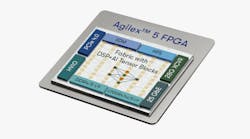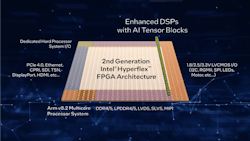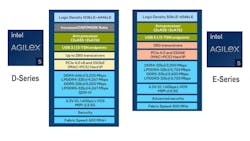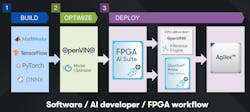Mid-Range FPGA Brings AI and Longevity to Developers
What you’ll learn:
- Where Intel’s Agilex 5 fits in the product line.
- How Agilex 5 incorporates AI acceleration.
- Why Agilex’s long product life is important.
Intel Altera filled out its Agilex 5 with the D and E series of mid-range FPGAs that include enhanced DSP blocks to accelerate artificial-intelligence and machine-learning (AI/ML) applications (Fig. 1). They include multiple hard-core, asymmetric Arm v8.2 Cortex-A55 and Cortex-A75 processors and over 640K logic elements (LEs). The family targets applications in fields such as medical, robotics, and industrial that need efficient, high-performance custom logic with AI/ML hardware support.
The AI/ML support includes Tensor blocks integrated with the DSP blocks that double the performance per watt compared to previous FPGAs in the family. The latest versions have 5X the INT8 resources with an INT8 performance of 56 TOPS.
The second-generation Hyperflex FPGA architecture includes support for 32 lanes of PCI Express Gen 4 and 10/25 G Ethernet (Fig. 2). The transceivers can run at speeds up to 28 Gb/s and the MIPI D-PHYs reach 3.5 Gb/s. The FPGAs can handle DisplayPort and HDMI output as well as time-sensitive-networking (TSN) applications.
The AI/ML software capabilities start with popular platforms such as TensorFlow and PyTorch (Fig. 3). There’s also support for the open-source OpenVINO toolkit that works with the FPGA AI Suite and Quartus Prime FPGA design software.
Altera’s FPGA support now has a longer product lifetime that extends past 2040. This helps with long-life applications ranging from rugged systems to automotive. This addresses availability of hardware as well as software support and updates.





